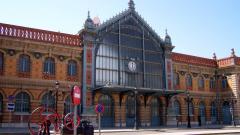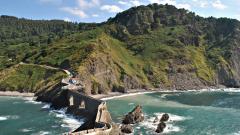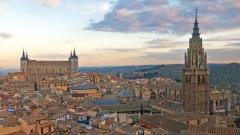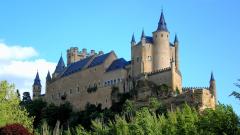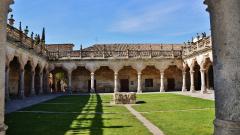 travel to Spain
travel to Spain
GENERAL CHARACTERISTICS
Spain is a social-democratic country, located in Europe's occidental area, and it is also an active member of European Union (UE), his official currency, therefore, it's the Euro. It has a population of 47 million people, distributed in seventeen autonomous communities and two independent regions.
Its capital is Madrid, its official language is Spanish, spoken throughout the territory. There are other three co-official languages, Catalan, Galician and Basque spoken in different northern territories. The predominant climate is the continental Mediterranean, which is granted mild temperatures in most of it, being cooler in the Cantabrian coast, and warmer in the south. The Canary Islands have tropical climate, due to its proximity to the African continent.
HISTORY
Different cultures have inhabited the peninsula until our days, from prehistoric tribes, Phoenicians, Iberians, Celts, Romans, Greeks etc. All of them, left their mark through historical vestiges, customs or the founding of cities. The most relevant presence was the Muslim one, which began in 711, establishing its most important population centre in the south, where they form the Kingdom of Al-Andalus, with capital in Córdoba. This period was characterized by a great cultural, scientific and linguistic splendor, but in the 11th century they fell into decline and in 1492 they were expelled by the Catholic Monarchs.
In that same year the discovery of the American continent took place, which in the coming seasons granted the country, a privileged position thanks to the trade with silver, gold and other materials that existed there and until then unknown. In 1895 the country lost its last colonies, putting an end to the colonial era.
The beginning of the 20th century is marked by political instability, which triggered a civil war, that end with a military dictatorship, following the European trend. When the dictatorship time finished, in the eighties, Spain made its way into the international market living a few years of prosperity, until the well-known global crisis.
TOURISM
Spain has been able to achieve an important status in the tourism industry, since the 1970's, when the government started to encourage the sun & beach tourism in the country. Nowadays the situation has changed, Spain received 75 million of international tourists last year, been able to develop all types of tourism. With the past of the time, and thanks to first quality infrastructures, this activity has been transformed into one of the bases of the country's economy.
Besides, Spain stands out in heritage tourism, due to the diverse populations who inhabited the peninsula that has made its own, an incomparable cultural background whom everybody can enjoy of. Furthermore, his strategic location has granted a fast development and a very rich heritage because has served as a nexus between Europe, The Mediterranean Sea and Africa.
Moreover, we can find a great variety of art evidences including all the art styles throughout the peninsula, we can enjoy cave paintings (Altamira Caves, Cantabria) but also, walking around for a few kilometers, we can enter in the Guggenheim Museum, Bilbao, one of the references in Modern art at a worldwide scale.
In addition, Spain has plenty of local festivities where we can enjoy of a lot of activities and know all the regions lifestyles that compound the territory.
Finally, with all of these ingredients, we can affirm that Spain is a multidisciplinary, solid, open and in constant evolution destination, where all the visitors will feel embraced and they'll enjoy a unique travel experience.
practical information
useful information before leaving
Language
Religion
Political regime
Currency
Warnings
Documentation
Vaccines
recommendations
Recommendations before traveling to Spain
- It is recommended to visit Spain in spring or autumn, to avoid the high temperatures, mainly, in the coastal areas, on the other hand, if you prefer the north, you can take advantage, and visit it in summer, because there is a fresher climate.
- If you travel to the north or the surrounding areas, it is advisable, to take winter clothes and a light raincoat since it is the rainiest area of the country, and it can rain anytime, especially in winter.
- The Spain's emergency number is 112, in the touristic areas, this telephone service it's available in English, French and German.
- It is a safe country, but you should pay attention to your belongings, particularly, in downtowns and crowded areas.
- You could pay with credit card, with travel checks along with your passport. Most part of the restaurants, shops and businesses accept these payment methods. Also, you could do money exchange in specialized businesses, banks, and most part of the hotels and travel agencies.
- Great part of the business premises will be open from Monday to Saturday, from 9:30 to 13:30 in morning schedule, and from 16:30 to 20:00 in afternoon schedule.
- The opening time of shopping centers, malls and large stores will be, mainly from 10:00 to 21:00 or 22:00 non-stop.
- To call Spain from another country, you must dial +34 following of a 9 digits number.
- Tips aren't compulsory, they aren't included in the bill, the payment of this gratuities will depend on the customer.
- The voltage in the Spanish territory its 220W and 50Hz using alternate current. If your electronic devices work with a different voltage you'll need and adapter to plug in to the electric network.
regions of Spain
Know all the zones and cities that you can discover in your trip



